Here at RoadRunner, we know the recycling process can be very confusing. That’s why we wanted to simplify it for you and answer some of the more common questions surrounding recycling.
Commonly asked questions
Is it really beneficial for the environment?
I've seen headlines that recycling isn't cost-effective. What does that mean?
Can recycling help my business?
What's the difference between single-stream recycling and what RoadRunner offers?
Why can't I put plastic bags in my recycling bin?
What should I do with my pizza box?
Are clothes and shoes recyclable?
The arrows on a plastic container mean it is recyclable, right?
What happens after they collect the items from my recycling bin?
What can be made from the stuff in my recycling bin?
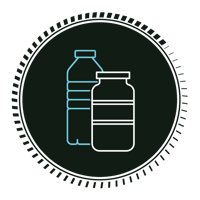 What is recycling?
What is recycling?
Recycling is the process of collecting items that would otherwise just be thrown away as trash and processing those materials into new products. It is important to understand that just because you put something into your recycling bin does not mean it will in fact end up being created into a new product.
(back to the list of questions)
 Is it really beneficial to the environment?
Is it really beneficial to the environment?
According to the Environmental Protection Agency, that’s an absolute yes! Data has shown over and over that recycling conserves energy and natural resources. Recycling cardboard only takes 75% of the energy needed to make new cardboard for example. More energy is needed to produce cardboard from a tree than what is required to manufacture it using recycled materials. Products being recycled often do not require as much processing to turn them into usable raw materials.
(back to the list of questions)
 I’ve seen headlines that recycling isn’t cost-effective. What does that mean?
I’ve seen headlines that recycling isn’t cost-effective. What does that mean?
This isn’t a new debate. For years, the costs and benefits of plastic recycling have been looked at for example. It comes down to how much it costs to collect, transport, sort, break down and reform into new products. It also involves the supply and demand of materials. It is cheaper in many cases for a petrochemical company to make virgin plastic from oil than it is to use recycled material to create products.
On the other hand, a well-run and properly managed recycling program can be cheaper than other forms of waste disposal for a business. Recycling metal and glass is absolutely cost-effective. Aluminum is a material that can be recycled indefinitely and takes as much as 95% less energy to produce products than using virgin material. Glass is highly recyclable in a way that doesn’t lose quality each time it’s broken down. Beyond dollars and cents, other factors to consider in the debate are the impacts on people and the environment.
(back to the list of questions)
 Can recycling help my business?
Can recycling help my business?
The short answer is yes! Recycling can reduce your operating costs. You’ll generate less trash which means dumpsters take longer to fill up. They won’t need to be emptied as often meaning lower waste disposal bills. Recycling elevates your company’s image and improves your Environmental, Social, Governance (ESG) rating. Major Wall Street companies are now tracking investor behavior related to a company’s environmental impact. Implementing a program in your office can be easy, efficient and helps your bottom line.
(back to the list of questions)
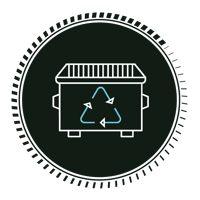 What’s the difference between single-stream recycling and what RoadRunner offers?
What’s the difference between single-stream recycling and what RoadRunner offers?
Single-stream recycling is easy on the consumer. Everything gets put into one recycling bin that gets emptied. The materials are mixed together meaning it takes longer to sort and therefore costs more money. It often results in contamination resulting in lower prices for the material and much of it is sent to the landfill. The companies RoadRunner works with do offer single-stream recycling if that is what a customer wants, however.
RoadRunner's RecycleMORE™ program, on the other hand, offers location-specific, tailored recycling services that not only increase the volumes diverted from landfill but also drive cost savings. RoadRunner's professional recycling advisors work with individual businesses to analyze each location and waste stream to determine the type of recycling that is best suited.
Additionally, when and where it makes sense for your business, RoadRunner can implement our innovative CleanStream™ recycling services to improve landfill diversion, drive additional savings and improve ESG reporting. Stream-specific bins are provided so that recyclables can be pre-sorted prior to pick up. An efficient fleet of local haulers is able to take these materials directly to a recycling facility without any time-consuming sorting or contamination issues.
These programs are just one part of the fully-managed waste services RoadRunner offers.
(back to the list of questions)
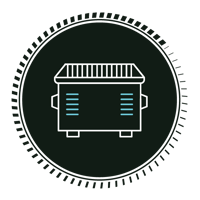 What can be recycled?
What can be recycled?
This isn’t an exhaustive list and the best advice is to check with your local municipality, borough, city or town to find out what is and what is not recycled where you live. Additionally, just because your recycling program doesn’t accept an item doesn’t mean it can’t be recycled. You may have to find a specialized facility, drop-off location or event near you.
Here are items that are widely accepted in recycling programs:
- Paper
- Newspaper
- Envelopes
- Junk mail
- Phone books
- Brochures
- Magazines
- Flattened cardboard
- Boxes
- File folders
- Posterboard
- Frozen food boxes
- Milk cartons
- Plastic bottles, jugs, tubs, cups
- Milk jugs
- Soda bottles
- Water bottles
- Shampoo/soap/detergent bottles
- Glass bottles and jars
- Metal cans
- Aluminum cans
- Tin cans
- Scrap metal
(back to the list of questions)
 What can’t be recycled?
What can’t be recycled?
The answer depends on a number of factors including location, cost, size, condition of the materials, and so on.
While the majority of these items are typically not acceptable in curbside recycling programs, you can often find places nearby that will recycle some of these things. Take a few seconds to do an internet search and you’ll likely find a facility or hard-to-recycle event close to where you live. Don’t just blindly throw things into the recycling bin either. It causes contamination and the whole load will just end up in the landfill.
Here is a general list of items typically NOT accepted in curbside programs:
- Appliances
- Aerosol cans that aren’t empty
- Batteries
- Bubble wrap
- Broken glass
- Bowling balls
- Christmas lights
- Wire coat hangers
- Diapers
- Electrical cords
- Electronics
- Food waste
- Food wrap
- Garden hoses
- Needles
- Plastic bags
- Polystyrene (styrofoam)
- Propane tanks
- Rubber balls
- Sports equipment
- Stuffed animals
- Syringes
- Razor blades
- Tires
- Wood
- Yard waste
(back to the list of questions)
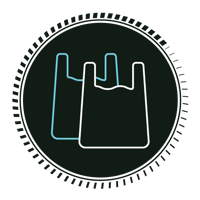 Why can’t I put plastic bags in my recycling bin?
Why can’t I put plastic bags in my recycling bin?
Single-use plastic bags shouldn’t be put in your bin because they can wreak all kinds of havoc at facilities. They can often clog equipment and get tangled around moving parts. This causes equipment to break and forces shutdowns until things can be repaired. During that time, the materials are then simply diverted to the landfill or pile up, causing a backlog that takes longer to process. Many local grocery stores offer bins in which you can drop off plastic bags to be recycled.
(back to the list of questions)
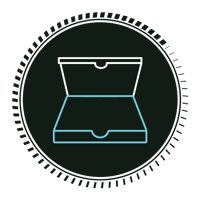 What should I do with my pizza box?
What should I do with my pizza box?
How greasy and cheesy is the cardboard? If it’s only lightly soiled or is in great condition, you can recycle the whole thing. Sopping with grease? Toss it in the garbage. Even consider cutting or ripping off the soiled part and recycling the rest of it. Pizza boxes are cardboard, a highly sought-after material that can be recycled into new products. Your best bet is to contact your local recycling company or facility for more information.
(back to the list of questions)
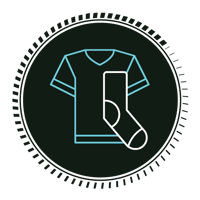 Are clothes and shoes recyclable?
Are clothes and shoes recyclable?
Don’t put them in your bin. Textiles, much the same as plastic bags, will snarl equipment causing it to break and shut down. Instead, find a charity that will take gently used items. Some retail stores like Nike have bins inside where they will accept and recycle shoes. A quick internet search will give you a few places close to where you live where you can drop off items.
(back to the list of questions)
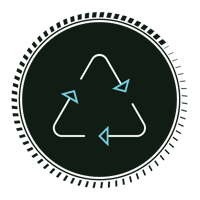 The arrows on a plastic container mean it is recyclable, right?
The arrows on a plastic container mean it is recyclable, right?
Not so fast. Just because it has a number inside the arrows does not mean it is recyclable. Called the Resin Identification Coding system, manufacturers stamp a designated number on their product to indicate what it’s made out of. Plastics 1 and 2 are widely accepted by most recycling programs. You’ll have to find out on your own if Plastics 3 through 7 are accepted. If not, there may be a place nearby that will collect it. No one regulates the symbol, however, so any company is free to place it on their product.
(back to the list of questions)
 What happens after they collect the items from my recycling bin?
What happens after they collect the items from my recycling bin?
Often, the items get trucked to a Material Recovery Facility (MRF) located nearby. At the MRF, humans and machines sort the recyclables by their different material types. Bottles and cans are crushed to create what’s called a bale. The materials are then sold to companies that process them and create new products.
(back to the list of questions)
 What can be made from the stuff in my recycling bin?
What can be made from the stuff in my recycling bin?
Everything around you right now could be made from recycled material! Cardboard is typically used to make new cardboard, paperboard and paper bags. Newspapers can be made into telephone books, construction paper and egg cartons. Plastics can be made into new milk jugs, water bottles and even benches and playground equipment. Recycled glass is used in road construction, new glass containers, flooring and pipes. Constantly evolving technology and a growing emphasis on a circular economy means the list of items that can be made from recycled materials is always expanding.
(back to the list of questions)
Hopefully, this helped answer a few of your questions surrounding recycling. As stated above, we encourage you to contact your local recycling programs and facilities to get a better understanding of how the process works where you live. The more we can all divert items from the landfill and recycle them into something new, the better off we’ll all be.
CLICK HERE to check out more from our Blog.
